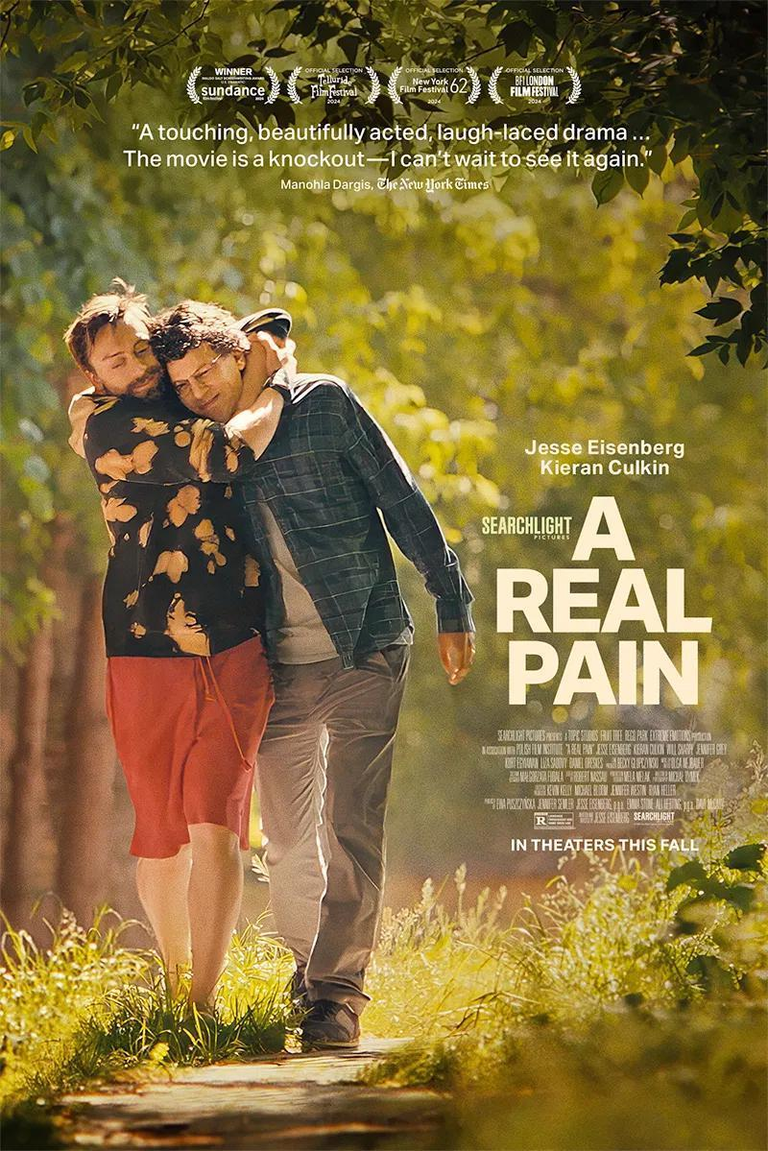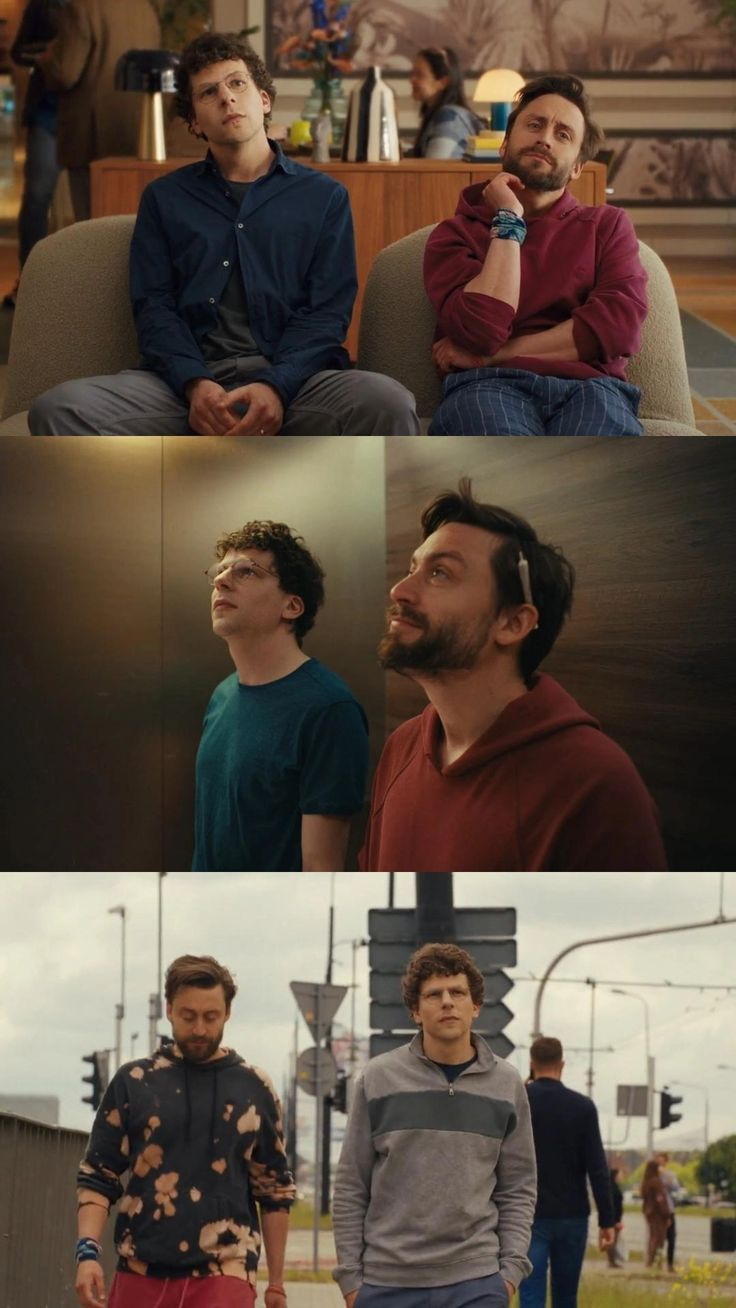Review: A real pain (2024)
Hello! As part of our ongoing efforts to improve both interaction and curation in the Movies and TV Shows Community, this post is one of many to highlight and boost members of the past Day that have Hola cinefilos de Hive! Today I bring you a review of one of the best movies I've seen lately. A real pain, from last year (2024) directed by and starring Jesse Eisenberg is a drama that shows us an honest and sensitive portrait about grief, brotherly bonds, guilt and the human essence.
Hola cinefilos de Hive! El día de hoy les traigo la reseña de una de las mejores películas que he visto últimamente. A Real Pain, del año pasado (2024) dirigida y protagonizada por Jesse Eisenberg es un drama que nos muestra un retrato honesto y sensible sobre el duelo, los vínculos fraternos, la culpa y la esencia humana.

In the world of cinema, where many directors avoid uncomfortable stories, comes a blockbuster entitled “A Real Pain”, written and directed by Jesse Eisenberg, which invites us to face the painful from an intimate, contradictory and very human space. The film narrates the reunion of two cousins, David (played by the director) and Benji (played by Kieran Culkin), who travel to Poland to pay tribute to their deceased grandmother, a Holocaust survivor. What begins as a memorial tour, turns into a very emotional journey, full of somewhat crazy moments, old wounds and questions without certain answers.
The tone of the film veers between comedy and existential drama, which for me is closer to drama because the “comic” moments only reflect wounds in the characters. Eisenberg plays with the uncomfortable, with what can't be said or won't be said, with silence, with those who love each other but don't understand each other and with how difficult it is to grieve. David is a reserved man, very quiet and somewhat anxious; Benji, on the other hand, is unpredictable, sensitive and intense. This contrast makes for an interaction that is as painful as it is funny. Their conversations, gestures and disagreements are filled with a tension that reflects not only personal differences, but also the different ways in which grief and the past can be dealt with.
En el mundo del cine, donde muchos directores evitan las historias incomodas, aparece un peliculón titulada "A Real Pain", escrita y dirigida por Jesse Eisenberg, la cual nos invita a enfrentarnos a lo doloroso desde un espacio íntimo, contradictorio y muy humano. La película narra el reencuentro de dos primos, David (interpretado por el director) y Benji (interpretado por Kieran Culkin), quienes viajan a Polonia para rendir homenaje a su abuela fallecida, una sobreviviente del Holocausto. Lo que comienza como un tour conmemorativo, se convierte en un viaje muy emotivo, lleno de momentos algo locos, heridas viejas y preguntas sin respuestas certeras.
El tono de la película circula entre comedia y drama existencial, lo cual para mi se acerca más al drama porque los momentos "cómicos" solo reflejan heridas en los personajes. Eisenberg juega con lo incomodo, con lo que no se puede decir o no se quiere decir, con el silencio, con los que se quieren, pero no se entienden y con lo difícil que es llevar un duelo. David es un hombre reservado, muy tranquilo y algo ansioso; Benji, en cambio, es impredecible, sensible e intenso. Este contraste da lugar a una interacción que resulta tan dolorosa como divertida. Sus conversaciones, gestos y desacuerdos están llenos de una tensión en la que se refleja no solo las diferencias personales, sino también las diferentes formas en las que se puede lidiar con el duelo y con el pasado.
One of the most relevant aspects of the film is the way it reflects on memory and inherited trauma. After visiting concentration camps, listening to historical data, and sightseeing, they question whether it is really possible to connect with all that past suffering. Benji, in particular, rebels against this experience, he is a bit bothered by the fact that it is merely about tourism for morbid curiosity, leaving aside the emotional part of the people who really lived through all this chaos. It raises a subtle but powerful critique of “trauma tourism”.
Kieran Culkin's performance was brilliant, he is undoubtedly one of the pillars of the film. His performance apart from earning him several major awards, including the Oscar for Best Supporting Actor. He manages to convey what the director wanted; that vulnerability, that messy, euphoric and yet tender personality that is all that makes up the character. From the beginning Eisenberg was convinced that the role would be perfect for an actor who had the essence of Kieran and he wasn't wrong. Eisenberg not only holds the perfect balance as the counterpart, but also demonstrates great maturity as a director. The staging is sober, with warm, gray and somewhat melancholic landscapes that accompany the tone of the story, and along with it Chopin pieces are included, so everything becomes a little more emotional.
Uno de los aspectos que mas tiene relevancia en la película es la forma en la que se reflexiona sobre la memoria y el trauma heredado. Luego de visitar campos de concentración, escuchar datos históricos, y turistear, se cuestionan si es posible realmente conectar con todo ese sufrimiento pasado. Benji, en especial, se rebela contra esa experiencia, le molesta un poco el hecho de que se trate meramente del turismo por morbo o curiosidad, dejando muy de lado la parte emocional de las personas que realmente vivieron todo este caos. Plantea una crítica sutil pero poderosa al “turismo del trauma”.
La actuación de Kieran Culkin fue brillante, es sin duda uno de los pilares de la película. Su interpretación aparte de que le valió varios premios importantes, incluido el Oscar a Mejor Actor de Reparto. Logra transmitir lo que el director quería; esa vulnerabilidad, esa personalidad desordenada, eufórica y a la vez tierna que es todo lo que compone al personaje. Desde el principio Eisenberg estaba convencido de que el papel estaría perfecto para un actor que tuviera la esencia de Kieran y no se equivocó. Eisenberg aparte de que sostiene el equilibrio perfecto como contraparte, también demuestra una gran madurez como director. La puesta en escena es sobria, con paisajes cálidos, grises y algo melancólicos que acompañan el tono de la historia, y junto con ello se incluyen piezas de Chopin, así que todo se torna un poco mas emotivo.

With a running time of 90 minutes, A Real Pain doesn't pretend to solve anything. There is no plot twist, no forced closure. Its strength lies in the ambiguity, in the clash between humor and pain, in the small fissures of family ties. It is a film that talks about what hurts without falling into extreme drama, and that leaves room for us to reflect on our history and be aware of our essence.
If you are interested in films that combine the personal and sentimental with the historical or specifically with what happened in the Holocaust, that do not underestimate the intellectual capacity of the audience and that dare to make us uncomfortable and allow us to cry, this is a gem that you should not miss.
Con una duración de 90 minutos, A Real Pain no pretende solucionar nada. No hay plot twist, ni cierres forzados. Su fuerza está en lo ambiguo, en el choque entre el humor y el dolor, en las pequeñas fisuras de los vínculos familiares. Es una película que habla de lo que duele sin caer en el drama extremo, y que deja espacio para que también podamos reflexionar sobre nuestra historia y estar consientes de nuestra esencia.
Si les llama la atención las películas que combinan lo personal, y lo sentimental con lo histórico o específicamente con lo que se vivió en el holocausto, que no subestiman la capacidad intelectual del público y que se atreven a incomodar y a permitirnos llorar, esta es una joya que no deberían dejar pasar.

Thanks for reading and watching.
